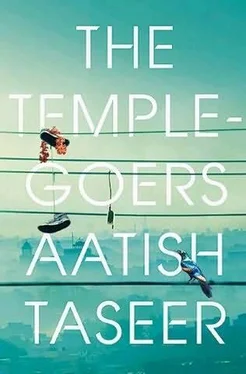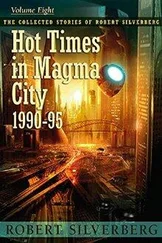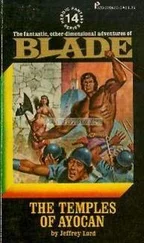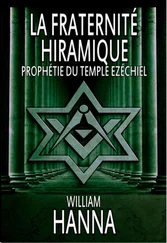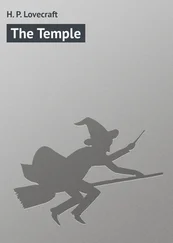Now smoking at will, sipping his beer, his turban still on, he read into my silence. As was so often the case with him, he had not introduced me to Megha without a purpose. He said, ‘Our love match is not going to be easily accepted by this world. I’ll need my friends. If things become difficult, you’ll help me, no?’
‘Me? How can I help you?’
‘You can. You know people. Your mother’s a journalist. The owner of TVDelhi just hangs out in your girlfriend’s house.’
‘The owner of TVDelhi, who do you mean?’
‘You know that woman who was there that day at Sanyogita’s when Lul was reading his homo story.’ At this Megha’s wet lips opened and her laughter rang out. I looked at Aakash in puzzlement. A private moment passed between them. Her eyes were full of some unexplained significance, which Aakash dismissed with a firm look. ‘The woman,’ he continued, ‘with the red bindi and the grey hair, and those huge silver bangles, owns TVDelhi.’
‘I had no idea,’ I said, genuinely surprised.
‘Please, man. You have to do this for me. In this country, we can’t trust the police, we can’t trust NGO workers, we can’t trust government people, but we can trust the press. You have to speak to this woman about our situation. Just so we have help, if we need it.’
I couldn’t understand his urgency. ‘For what?’
‘For nothing yet,’ he said, draining his glass and sitting forward. ‘But maybe later.’ Removing his turban, his messy look pasted to his head, he added, ‘Should things get ugly.’
The first pale sky of the winter was reflected in the tanks of dark water outside the National Museum. Pedal boats glided over its glassy surface, dark small-leaved jamun trees dotted the esplanade and bright ice-cream trucks crowded the edge of the grass. In the distance, a runway-sized road led up to the President’s Palace, and Parliament, a low, punctured cylinder, brooded on the side. Nearer to the domed, sandstone museum, a black rubber hosepipe lay in the grass, choking out a wide puddle of smelly water.
A writer had come to town. My mother was a friend of his wife and was hosting a dinner in their honour. He was a writer I had come to admire. I had first met him in London when I was eighteen and on my way to college in America. He had advised me not to go: ‘Indians go to these places and all they ever learn is the babble.’ At the time the remark offended me, not because of what was said but because of his tone: cold, dismissive, uncaring that he had upset my plans. I went anyway.
The next time we met was in Delhi and I was in my last year of college. I was writing a thesis at the time on how the Mahatma, through a programme of celibacy and dietetics, had sought to overcome the body. In doing so, he negated the source of interests in Western society, interests such as property and self-preservation, making it possible for him to fight the British with a coin different from theirs. For all their threats to his body, they would never have any purchase over his soul. The writer listened for a while, sipping a martini he had been complaining about earlier, then said, ‘But there’s a great flaw in your theory. Because the British could have killed him; they could have destroyed his body. Then there would have been nothing to house his soul. What kind of victory is that?’ The adviser in college who had fed me the idea for the thesis hadn’t thought of that. When I went back to him with it, he confessed that the true rewards of the Mahatma’s programme were not temporal but metaphysical. I did the thesis, but lost interest. I read the writer’s books instead, all of them, carefully. He was the first writer I had read in this way. I felt a great feeling of release reading the books. He could take big ideas such as colonialism, defeat, occupation and show their effects in small human ways like lying and boasting, in hidden anger and resentments. I felt the writer release me from a sense of entitlement that I had about the West, a feeling that since they colonized us they owed us education, technology, duty-free goods. He released me by exposing the attitude as not post-colonial in any real way, but still very colonial; one that some in the West might happily endorse. It was an attitude that would forever leave us robbed of responsibility and the privilege of blaming oneself for one’s failures.
My mother was hosting a dinner for the writer, but first he wanted to go to the National Museum to see the bronzes; he asked that I come along. I’d never been to the National Museum, though I’d been to many museums in many countries; I had never seen any bronzes. I was waiting in the porch of the museum when the writer’s Ambassador drove in. His wife was with him, a handsome Punjabi woman with green eyes.
‘Leave it, leave it in the car,’ she said of the writer’s green felt hat. She thought it would make him look English. It would mean us all paying the foreigners’ entry fee, which was thirty times as much as the regular fee. I had already anticipated this and had sent Uttam in to buy three tickets in advance. The security was tight, both because of the blasts and because there was an exhibition in the museum of the Nizam of Hyderabad’s jewels. Mobile phones had to be left outside, handbags were searched, a fuss was made over the writer’s brown leather shooting stick. Then the security guard in his olive-green uniform wanted to know why we had bought the Indian ticket.
‘Because we’re Indians,’ I answered in Hindi.
‘Show me your passport or ration card,’ he said.
We weren’t carrying any identification, but neither were a group of young men in polyester shirts and baggy trousers.
‘Why aren’t you asking them for identification?’ I said.
‘Because they look like Indians,’ the security guard replied.
‘And why don’t we look like Indians?’ the writer’s wife intervened.
The man was stumped; it was just a feeling, a class feeling.
‘We’re speaking Hindi, aren’t we?’ the writer’s wife pressed him. ‘Would we be speaking Hindi if we weren’t Indians?’
The man smiled. ‘Some foreigners have learned as well,’ he said, shaking his head from side to side. ‘But never mind, carry on.’
The writer had watched the whole scene. His eyes were dim and old, but intent somehow. They were set in a faintly Asian cast. They could make events occurring right in front of them seem far away. The writer had recently had back trouble and needed help up the stairs. He took my hand in his small, firm hand, and once he’d got going, he moved fast. When we went in, inhaling the musty smells that surround any organization linked to the government of India, he wanted to rest for a few minutes. We sat down in the lobby in front of an eleventh-century stone statue of a man and a woman; the woman was leaning into the man and gentle rolls of fat were visible on the sides of her waist. The writer caught his breath, then looked up and said, ‘Why don’t you sit down? You’ll be able to consider it better that way.’
His wife, who was dressed in a green, black and yellow salwar kameez, continued to stand. I sat down; a few awkward moments of silence passed between us as I tried entering the world of the statue.
The writer started us off. He said that the statue was from Khajuraho and that he had a special feeling for the Chandela dynasty as he was named after one of its kings. ‘The son in fact,’ the writer said, ‘of the man who was king when the invaders came. He had to move away. And that saved the Khajuraho temples. The bush grew over them. I fear that now they’re admired for their erotic content, which is foolish.’
I looked harder at them, but I noticed only outside things: the spotlight and its loose wires; the roughly made pedestal on which they stood. They seemed closed to me; I still had nothing to say. I felt as I had with Aakash in the temple.
Читать дальше
